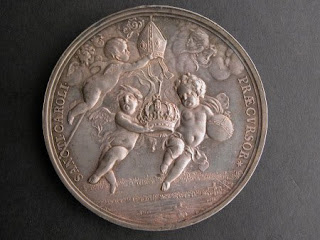"Parliaments are the best preservers of the rights of this kingdom": Laud, 'absolutism', and the mixed constitution
I have previously pointed to a High Church vision of constitutional order with a mixed polity, derived from Hooker, flowing Lancelot Andrewes, through the Laudians, and into the 18th century. Indeed, Waterland's 1723 Restoration Day sermon and Swift's 1725 Royal Martyr Day sermon illustrate how this commitment to a Hookerian mixed constitution found expression in High Church critique of the Personal Rule.
What, however, of Laud himself, so often associated with the accusation of supporting 'absolutism'? In his defence at his trial before the House of Lords, Laud provided a thoroughly Hookerian account of the mixed constitution. He did recognise, in a manner not dissimilar to Hooker in the Preface of the Lawes, how the divisive parliamentary confrontations "of later years" - inspired by Puritan agitation - threatened the peace and good order of the commonwealth. Crucially, Laud robustly affirmed the place of parliaments in the mixed constitution: "Parliaments are the best preservers of the ancient laws and rights of this kingdom".
Laud, then, stands firmly within this High Church tradition which adhered to and expounded the Hookerian vision of the mixed constitution. To identify Laud with 'absolutism' (itself a problematic term) is to entirely overlook how he defended the mixed constitution even as the Puritan agitation disordered the workings of the constitution - an agitation which would, as Laud rightly feared, lead to violent confrontation, tearing the peace of the commonwealth. Laud was, of course, prophetic: the bloody civil wars in the three Kingdoms, the wrecking of the constitution of Church and State, and the tyranny which followed were all the consequences of "a malignant party" disordering and disturbing the right workings of parliament.
Laud and the Laudians were no advocates of 'absolutism': they were defenders of the mixed constitution, with parliaments rightly working with the Crown for the peace and well-being of the realm.
I have neither advised nor procured the preaching, printing, or publishing of any sermons, or other discourses, in which the authority of parliaments, and the force of the laws of this kingdom are denied, and an absolute and unlimited power over the persons and estates of his Majesty's subjects maintained and defended. Nay, I have been so far from this, that I have, since I came into place, made stay of divers books, purposely written to maintain an absolute power in the kingdom, and have not suffered them to be printed, as was earnestly desired ...
I did never labour to subvert the rights of Parliaments, or the ancient course of their proceedings ... It is true, I have been much and very often grieved, to see the great distractions which have happened of later years, both in King James his time, and since, about the breaches which have been in Parliaments. And I have as heartily wished, and to my power endeavoured, that all Parliaments which have been called, might come to their happy issue, and end in the contentment of the King and his people. And I have ever been of opinion, and I shall live and die in it, that there can be no true and settled happiness in this or any other kingdom, but by a fair and legal, as well as natural agreement between the King and his people. That according to the course of England this agreement is in a great proportion founded upon Parliaments ...
This, in conclusion, I clearly think; Parliaments are the best preservers of the ancient laws and rights of this kingdom. But this I think too, that corruptio optimi est pessima; that no corruption is so bad, so foul, so dangerous, as that which is of the best. And therefore, if Parliaments should at any time be misguided by practice of a malignant party; nothing then so dangerous as such a Parliament; because the highest remedy being corrupted, there's no free redress left at all. And we had a lamentable example of such a Parliament, when Hen. IV. was set up. For that Parliament was the cause of all the civil wars, and that great effusion of blood which followed soon after in this kingdom. God make us mindful and careful to prevent the like.
(The first illustration is of Restoration era coin commemorating the martyrdom of Laud. The reverse of the coin, as seen, shows the Archbishop preceding the Royal Martyr. The second is a 1649 print of Cromwell felling of the Royal Oak of Britain.)





Comments
Post a Comment